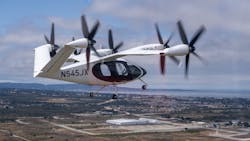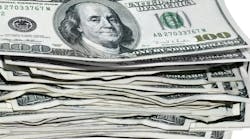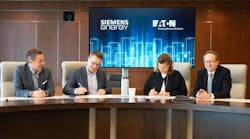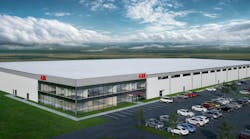So That Happened: Joby Prepares for Liftoff and... US Steel and Curling?
Editor’s note: Welcome to So That Happened, our editors’ takes on things going on in the manufacturing world that deserve some extra attention. This will appear regularly in the Member’s Only section of the site.
Do You Have $2 Million On Hand for Ransomware Fees?
Research firm Comparitech on July 2 released a new study of global ransomware statistics for the first half of 2025 and the news is not great.
The study found a 64% increase in ransomware attacks against manufacturers since the end of 2024, citing 713 attacks in total with 57 confirmed incidents. An incident is confirmed when the targeted organization discloses a cyberattack that involved ransomware and/or acknowledges a cyberattack claim made by a ransomware group.
We’ve heard so much about how popular manufacturing companies are for cybercriminals that I don’t bat an eye at numbers like these anymore.
However, what did strike me was the average ransomware demand—over $1.6 million. Verizon’s recent Data Breach Investigations Report said the median ransomware payment dropped last year from $150,000 to $115,000. So the chances of anyone actually coughing up $1.6 million are probably very low.
That said, if Comparitech’s data is correct, perhaps manufacturers who aren’t willing to heavily invest in cybersecurity or prepared to refuse ransomware demands might want to have a couple of million dollars in liquidity sitting around to pay off those threat actors when the inevitable cyberattack rolls around, just in case the cybercriminals aren't in the mood to make a deal.
—Dennis Scimeca
Steel, Canada, International Trade, Curling… Trust Us, There’s a Connection
When steel tariff negotiations between the U.S. and the rest of the world are perpetually on ice, why not try a little curling-rink diplomacy to bring countries together?
Japan-owned Nippon Steel’s latest acquisition, U.S. Steel, just announced its sponsorship of the Pan Continental Curling Championships. Held in Minnesota, this year’s championship will bring together the top bonspielers from around the world.
While the sponsorship choice might seem random, it’s actually a brilliant move on Nippon Steel’s part, building cross-border relationships. Minnesota claims the U.S. headquarters for Canada’s beloved quirky sport and is only a broom’s brush away from Fort Frances, Ontario. Besides its newly acquired steel infrastructure in the U.S., Nippon is also making inroads in Canada—having acquired an interest in a high-grade iron ore mine in Labrador. The venture is primed for manufacturing renewable steel, using hydro-electric power, that could be shipped around the world.
Will President Trump try to horn in on the curling trophy, like he did at the Club World Cup? For the future of evenhanded steel tariffs, we sure hope so.
—Laura Putre
Eaton Continues Doubling Down on Power Electronics, Data Centers
Power technology company Eaton has been on an investing, buying and partnership spree all year – targeting growth in the fastest-growing sector in the country, data centers. With AI and cloud technologies on the rise, there’s a massive need for more power distribution to feed the power-hungry data processing sites, to handle power movement within the facilities and manage the heat they generate.
So, the obvious choice for Eaton is buying a company that makes electric vehicle chargers.
Eaton expects to complete its purchase of Austin, Texas-based Resilient Power Systems Inc. by the end of the fall, expanding Eaton’s already large portfolio of EV-supporting technologies. But, the bigger target is the company’s underlying technology.
“There’s huge opportunity for future applications in data centers, port electrification and battery energy storage,” said Mike Yelton, president at Eaton’s Americas Region, Electrical Sector. “By leveraging Eaton’s manufacturing capabilities, field service organization and commercial scale, we’re confident we can expand the market for this innovative technology to data center and other customers looking to move faster, minimize costs and improve power distribution efficiency and reliability.”
The Resilient purchase follows a busy year for Eaton.
—Robert Schoenberger
Faraday in Trouble?
In a recent press release, EV start-up Faraday Future Intelligent Electric, announced it had secured $105 million in financing ($22 million of which was cash from previous investors). But buried beneath that good news, and conveniently not mentioned in the release’s title, was the real story: Faraday, along with two of its executives, received a Wells notice from the U.S. Securities and Exchange Commission (SEC) that after a three-year investigation, the Commission was recommending “enforcement actions” against Faraday Future. The actions could range from a cease-and-desist to repayment of funds. For the executives, Co-CEO YT Jia and Global President Jerry Wang, it could mean a bar from holding office in the company.
Faraday Future is alleged to have made false or misleading statements during its 2021 PPIPE and SPAC listing, which is a violation of federal securities law. Specifically, the alleged violations related to party transactions and the role of Jia in Faraday Future.
And while a Wells notice doesn’t mean the company has officially done anything wrong, Faraday, despite lots of product announcements and splashy launches, hasn’t managed to produce many cars or generate much revenue. If worst comes to worst, Faraday Future, Jia, and Wang will have to defend themselves in court.
—Jennifer Ramsay
Joby Prepares To Truly Take Off
The electric vertical take-off and landing aircraft market is quickly maturing, with various companies regularly celebrating certification and testing milestones or announcing investment rounds led by notable industrial or transportation names.
For Joby Aviation Inc., one of the leaders in the eVTOL space, it’s time for the rubber to truly meet the launchpad: Leaders of the California-based company this week announced they will double production of their electric air taxis at a plant near Monterey. Once ramped up and staffed up—Joby plans to hire hundreds of workers—the company’s capacity there will be able to produce 24 aircraft annually.
That output will be a relative drop in the bucket compared to what founder and CEO JoeBen Bevirt and his team are planning in Dayton: There, Joby is installing equipment that will start ramping capacity toward executives’ goal of building up to 500 aircraft per year. The pipeline and partnerships to buy those eVTOLs—which can nearly silently carry four passengers at up to 200 miles per hour—appear to be there: Joby’s largest investor is Toyota Motor Corp. and Bevirt et. al also have connected with Uber Technologies Inc., Delta Air Lines Inc. and Korea’s SK Telecom, among others.
“Reimagining urban mobility takes speed, scale, and precision manufacturing. Our expanded manufacturing footprint in both California and Ohio is preparing us to do just that,” said Eric Allison, Joby’s chief product officer. “We celebrated the opening of the new facility with the flight of our sixth aircraft, which earned airworthiness certification within a week of completion.”
—Geert De Lombaerde
You’ve Heard of Greenwashing, but What About Greenhushing?
31% of respondents surveyed in the 2025 U.S. Business Sustainability Landscape Outlook EcoVadis study say their businesses have increased sustainability investments but have reduced public promotions of them since the beginning of this year. In addition, 8% say they have continued to invest in sustainability but have stopped talking about their commitments publicly.
Many companies are talking about their sustainability strategies less, but they are still an important factor in business success “even as political backlash threatens to roll back key ESG regulations,” writes the report. 65% of respondents say supply chain sustainability is a competitive advantage, and 52% of finance leaders say it directly supports competitiveness and growth. Only 4% of directors and VPs and 5% of C-suite leaders said that reducing or eliminating ESG oversight would have no negative impact on the global supply chain.
Leaders also seemingly prioritize accountability, as 63% of respondents say that ESG regulatory rollbacks could backfire or create more sustainability risks. Companies are also looking to improve ESG data reporting, with 53% planning to adopt or expand ESG risk mapping tools over the next 12 months.
“Even as the debate over business sustainability heats up, executives are focused on the reality – sustainability is what keeps supply chains running and customers on board,” says Pierre-François Thaler, co-founder and co-CEO of EcoVadis.
—Anna Smith
Leadership Change at Kenvue as Board Considers Strategic Alternatives
Thibaut Mongon is out as CEO of Kenvue Inc., maker of such brands as Listerine and Neutrogena, and Kenvue board director Kirk Perry has been named to fill the leadership position on an interim basis. Among his previous positions, Perry spent 23 years with Procter & Gamble, including as president of Global Family Care.
The consumer packaged goods manufacturer’s board of directors announced the leadership change July 14 and said it was part of a broader strategic review to “best position the company for future success,” according to board chair Larry Merlo. In May the company replaced its chief financial officer.
In announcing the CEO change, the board said its strategic review would consider a range of options, including a simplified portfolio and operating structure.
Kenvue, ranked No. 96 on the IndustryWeek U.S. 500, in 2024 completed its first full year as an independent company, having emerged when Johnson & Johnson spun off its consumer health business in 2022. In Kenvue’s first full year, revenue crept up by 0.1% to $1.03 billion, while net income sank by 38%, impacted both by higher brand investment and non-cash charges related to asset impairment, the company said.
In May, Kenvue shared 2025 Q1 results, which showed a 3.9% decline in net sales versus the prior year’s first quarter. Net income increased 8.8% to $322 million.
—Jill Jusko
About the Author
Dennis Scimeca
Dennis Scimeca is a veteran technology journalist with particular experience in vision system technology, machine learning/artificial intelligence, and augmented/mixed/virtual reality (XR), with bylines in consumer, developer, and B2B outlets.
At IndustryWeek, he covers the competitive advantages gained by manufacturers that deploy proven technologies. If you would like to share your story with IndustryWeek, please contact Dennis at [email protected].

Laura Putre
Senior Editor, IndustryWeek
As senior editor, Laura Putre works with IndustryWeek's editorial contributors and reports on leadership and the automotive industry as they relate to manufacturing. She joined IndustryWeek in 2015 as a staff writer covering workforce issues.
Prior to IndustryWeek, Laura reported on the healthcare industry and covered local news. She was the editor of the Chicago Journal and a staff writer for Cleveland Scene. Her national bylines include The Guardian, Slate, Pacific-Standard and The Root.
Laura was a National Press Foundation fellow in 2022.
Got a story idea? Reach out to Laura at [email protected]
Jill Jusko
Bio: Jill Jusko is executive editor for IndustryWeek. She has been writing about manufacturing operations leadership for more than 20 years. Her coverage spotlights companies that are in pursuit of world-class results in quality, productivity, cost and other benchmarks by implementing the latest continuous improvement and lean/Six-Sigma strategies. Jill also coordinates IndustryWeek’s Best Plants Awards Program, which annually salutes the leading manufacturing facilities in North America.
Have a story idea? Send it to [email protected].
Anna Smith
News Editor
News Editor
LinkedIn: https://www.linkedin.com/in/anna-m-smith/
Bio: Anna Smith joined IndustryWeek in 2021. She handles IW’s daily newsletters and breaking news of interest to the manufacturing industry. Anna was previously an editorial assistant at New Equipment Digest, Material Handling & Logistics and other publications.
Geert De Lombaerde
Senior Editor
A native of Belgium, Geert De Lombaerde has been in business journalism since the mid-1990s and writes about public companies, markets and economic trends for Endeavor Business Media publications, focusing on IndustryWeek, FleetOwner, Oil & Gas Journal, T&D World and Healthcare Innovation. He also curates the twice-monthly Market Moves Strategy newsletter that showcases Endeavor stories on strategy, leadership and investment and contributes to other Market Moves newsletters.
With a degree in journalism from the University of Missouri, he began his reporting career at the Business Courier in Cincinnati in 1997, initially covering retail and the courts before shifting to banking, insurance and investing. He later was managing editor and editor of the Nashville Business Journal before being named editor of the Nashville Post in early 2008. He led a team that helped grow the Post's online traffic more than fivefold before joining Endeavor in September 2021.
Robert Schoenberger
Editor-in-Chief
LinkedIn: linkedin.com/in/robert-schoenberger-4326b810
Bio: Robert Schoenberger has been writing about manufacturing technology in one form or another since the late 1990s. He began his career in newspapers in South Texas and has worked for The Clarion-Ledger in Jackson, Mississippi; The Courier-Journal in Louisville, Kentucky; and The Plain Dealer in Cleveland where he spent more than six years as the automotive reporter. In 2014, he launched Today's Motor Vehicles (now EV Manufacturing & Design), a magazine focusing on design and manufacturing topics within the automotive and commercial truck worlds. He joined IndustryWeek in late 2021.








